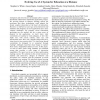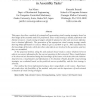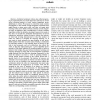212 search results - page 36 / 43 » What should the agent know |
HICSS
2000
IEEE
13 years 12 months ago
2000
IEEE
Computers and networks are increasingly able to support distributed collaborative multimedia applications. In fact, the growing interest in distance learning reflects the awarenes...
ICCV
1995
IEEE
13 years 11 months ago
1995
IEEE
This paper describes a method of systematically generating visual sensing strategies based on knowledge of the assembly task to be performed. Since visual sensing is usually perfo...
CORR
2010
Springer
13 years 6 months ago
2010
Springer
Abstract— Imitation learning in robots, also called programing by demonstration, has made important advances in recent years, allowing humans to teach context dependant motor ski...
IAT
2007
IEEE
14 years 1 months ago
2007
IEEE
Practical reasoning (PR), as advocated by philosophers is concerned by reasoning about what agents should do. It follows mainly two steps. A deliberation one for identifying the g...
ECAI
2010
Springer
13 years 7 months ago
2010
Springer
The two main questions in coalition games are 1) what coalitions should form and 2) how to distribute the value of each coalition between its members. When a game is not superaddit...



